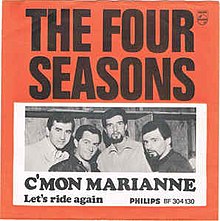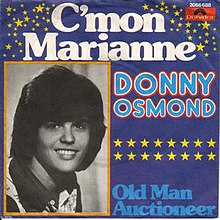
"I Can't Get Next to You" is a 1969 No. 1 single recorded by the Temptations and written by Norman Whitfield and Barrett Strong for the Gordy (Motown) label. The song was a No. 1 single on the Billboard Top Pop Singles chart for two weeks in 1969, from October 18 to October 25, replacing "Sugar, Sugar" by the Archies and replaced by "Suspicious Minds" by Elvis Presley. The single was also a No. 1 hit on the Billboard Top R&B Singles for five weeks, from October 4 to November 1, replacing "Oh, What a Night" by the Dells, and replaced by another Motown song, "Baby I'm For Real" by the Originals.

"Baby I Need Your Loving" is a 1964 hit single recorded by the Four Tops for the Motown label. Written and produced by Motown's main production team Holland–Dozier–Holland, the song was the group's first Motown single and their first pop Top 20 hit, making it to number 11 on the US Billboard Hot 100 and number four in Canada in the fall of 1964. It was also their first million-selling hit single.

"Get Together", also known as "Let's Get Together" and "Everybody Get Together", is a song by American rock band the Youngbloods, originally included in their 1967 debut album The Youngbloods. It was written in the mid-1960s by American singer-songwriter Chet Powers, from psychedelic rock band Quicksilver Messenger Service. The single was The Youngbloods' only Top 40 on Billboard Hot 100—peaking at number five in 1969.
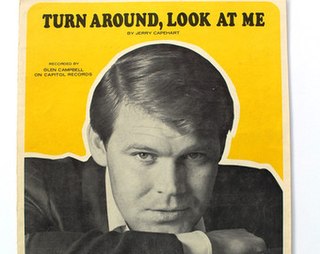
"Turn Around, Look at Me" is a song written by Jerry Capehart and Glen Campbell, though Campbell is not officially credited.

"Still" is a 1979 song by the soul music group the Commodores. It was released as a single on Motown Records with "Such a Woman" as the B-side. The song appears on their 1979 hit album Midnight Magic. It is notable for being their last No. 1 before Lionel Richie went solo.

"Who Loves You" is the title song of a 1975 album by The Four Seasons. It was composed by Bob Gaudio and Judy Parker and produced by Gaudio. It reached number 3 on the Billboard Hot 100 in November 1975.

"Tell It to the Rain" is a song composed by Mike Petrillo and Chubby Cifelli and popularized by The Four Seasons in 1966 and early 1967. The single reached the #10 position on the Billboard Hot 100 singles chart.

"Whatcha Gonna Do?" is a song by American rock group Pablo Cruise. This song was written by David Jenkins and Cory Lerios, two of the band's members. "Whatcha Gonna Do?" was a track from their album A Place in the Sun in 1977.
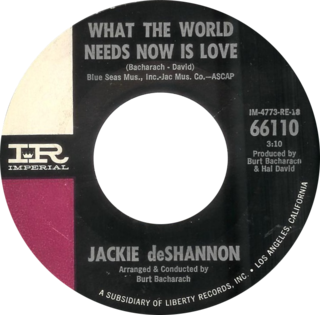
"What the World Needs Now Is Love" is a 1965 popular song with lyrics by Hal David and music composed by Burt Bacharach. First recorded and made popular by Jackie DeShannon, it was released on April 15, 1965, on the Imperial label after a release on sister label Liberty records the previous month was canceled. It peaked at number seven on the US Hot 100 in July of that year. In Canada, the song reached number one.

"Time" is a song released in 1981 as a single by the Alan Parsons Project. It was from their 1980 album The Turn of a Friendly Card. In the U.S., the song peaked at No. 15 on the Billboard Hot 100. On the U.S. Adult Contemporary chart, "Time" peaked at #10. In addition, "Time" spent two weeks at #14 on Cash Box, making it the group's second most successful single. Cash Box ranked it as the 94th biggest hit of 1981. Outside the US, the song peaked at #30 in Canada.

"Georgy Girl" is a song by the Australian pop/folk music group The Seekers. It was used as the title song for the 1966 film of the same title. Tom Springfield, who had written "I'll Never Find Another You", composed the music and Jim Dale supplied the lyrics. The song is heard at both the beginning and end of the film, with markedly different lyrics. It was nominated for an Academy Award for Best Original Song but the prize went to "Born Free".

"My Melody of Love" is the title of a popular song from 1974 by the American singer Bobby Vinton. Vinton adapted his song from a German schlager song composed by Henry Mayer, and it appears on Vinton's album Melodies of Love. The song was also recorded by Spanish pop singer Karina as "Palabras de Cristal".

"Love or Let Me Be Lonely" is a pop song recorded by the soul group The Friends of Distinction and released as a single in early 1970. The song was a multi-format success, peaking in the top 10 of the Billboard Hot 100 at #6 on May 1, 1970 and at #13 on the R&B chart. On the Adult Contemporary singles charts, "Love or Let Me Lonely" went to #9. The song is ranked as the 63rd biggest hit of 1970.

"What Cha Gonna Do with My Lovin'" is a 1979 song by American singer and songwriter Stephanie Mills, released as the first single from the album of the same name (1979). It became a hit, reaching No. 22 on the US Billboard Hot 100. It was also a top 10 hit on the Billboard R&B chart, as well as a minor hit in Canada.

"Stormy" is a hit song by the Classics IV released on their LP Mamas and Papas/Soul Train in 1968. It entered Billboard Magazine October 26, 1968, peaking at #5 on the U.S. Billboard Hot 100 chart and #26 Easy Listening. The final line of the chorus has the singer pleading to the girl: "Bring back that sunny day". The single, along with the prior release of "Spooky" and, soon after, the release of "Traces", formed a trio of solid hits for the band.

"I Guess the Lord Must Be in New York City" is a song written and recorded by singer-songwriter Nilsson in 1969. A track from his fourth studio album, Harry, it became his second charting single.

"I Live for Your Love" is a 1987 song by Natalie Cole. It was the second of four charting singles from her Everlasting LP, and was also the second greatest hit from the album.
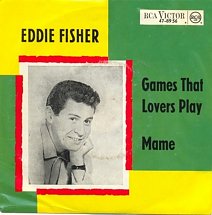
"Games That Lovers Play" is a popular song composed by James Last which became a hit for multiple artists in 1966 and 1967. The song has been recorded more than 100 times.

"The Drum" is a song recorded by Bobby Sherman from his Portrait Of Bobby LP. It was released as a single in the spring of 1971, the second of two from the album. The song was written by Alan O'Day, his first of five Top 40 chart credits.
"No Love at All" is a song written by Johnny Christopher and Wayne C. Thompson. It was recorded by American country music artist Lynn Anderson and released as a single in June 1970 via Columbia Records.
